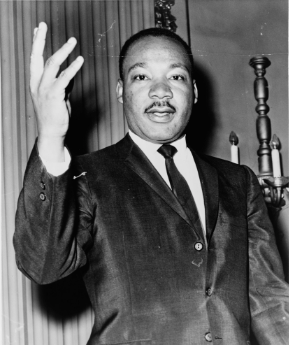photo courtesy of getty images
“Black people are born with clocks on our chests and knees on our necks. And we still find a way to create culture, to have hope, and to be beautiful,” is the iconic quote from Alex Bello’s (Form III) and Arianna Laureano Medina’s (Form III) speech about Afrofuturism presented on Tuesday, January 17, in the Africans in Diaspora Affinity Group’s assembly about Rev. Dr. Martin Luther King Jr, entitled. “Let Freedom Ring.” The twist was that it wasn’t just another tedious hour-long assembly given every year on MLK Day. Rather, it addressed how this amazing man did more than just help the civil rights movement; he helped further Black joy and excellence in this country; he paved the way for artists like SZA and Halle Bailey to become the vast successes they are today.
The first part of the assembly was the Silent Movement. This activity was put together by Star Blakney and Vera Koontz and was supposed to allow the student body to come together in their differences and similarities regarding their identities. They started with simple questions like “stand if you’ve seen the new Black Panther movie, Wakanda Forever,” and “stand if you know of a Black artist off the top of your head.” Then, they gradually moved to more vulnerable ones like “stand if you’ve had a history teacher with the same ethnicity as you,” which sparked a difference between who stood up and who did not, and “stand if your identity is something you rarely think about.” These aligned with the overarching theme of the assembly. Afterwards, they discussed how the Student Diversity Leadership Conference guided this idea for an interactive activity. Following this, there was a collection of photos composed by me about the Past (Dr. King coming to Fieldston on April 18th, 1964), the Present (First Bridge to Bridge event since 2019), and the Future (Ketanji Brown Jackson: First Black Women on the Supreme Court) examples of Black intelligence. Then, Mirembe Mubanda gave a speech written by Paulina Woods and Sira Basse about MLK’s often overlooked radicalism and how we must reclaim that legacy in today’s political climate. In addition, there were speeches by Juliette Reed and me about debunking the myth around our so-called “post-racial society” or, as some might call it, fulfilling the dream. Additionally, Alex Walker gave a speech regarding Dr. King’s visit to Fieldston. The final and seminal speech briefly stated before by Alex Bello and Arianna Laureano Medina discussed Dr. Martin Luther King Jr.’s dream about the Afrofuturist concept and creating a society that can look at itself and acknowledge the past and present inequalities that this country was built on. As Dr. King once said, “true peace is not merely the absence of tension; it’s the presence of justice.”
I had the pleasure of interviewing a couple of students about their opinions on how the assembly went and their opinions on the centering of Black joy, including students that worked on its creation. First, I interviewed Greg Brooks (Form III) who said, “I thought it was going to go smoothly; however, many people are pretty daft, and I don’t think it impacted how people viewed the topic. Black joy is a necessity; we need to talk about it, people are familiar with and understand Black struggle, but we rarely take the time to appreciate Black joy, so in the discussion of Blackness, we need to bring up Black joy and Black excellence in the conversation.” I also interviewed Morgan Washington-Patterson (Form III) who gave a speech about Fieldston students and their Dreams for a better and more inclusive place stated, “I think it had an effect, and most people watching the assembly learned a lot of things they didn’t know about students of color and a new perspective about people who don’t look like they think.” Finally, I interviewed Alex Bello, he said, “I had hoped the assembly would go well. We have had some assemblies that have been very repetitive in their message regarding MLK. The most important thing for me was making it feel different from other assemblies because so many assemblies can be very exhausting for my peers and me, so I wanted it to be very engaging. With the help of Dr. Merriweather and fellow students involved, it was.”
This assembly was about aiming the spotlight on Black happiness for once and celebrating Dr. King’s legacy instead of talking about the consistent trauma and pain Black people carry on their backs. Black love, excellence and triumph are just as important and should be discussed more; Black people are more than their suffering or the microaggressions they endure.






